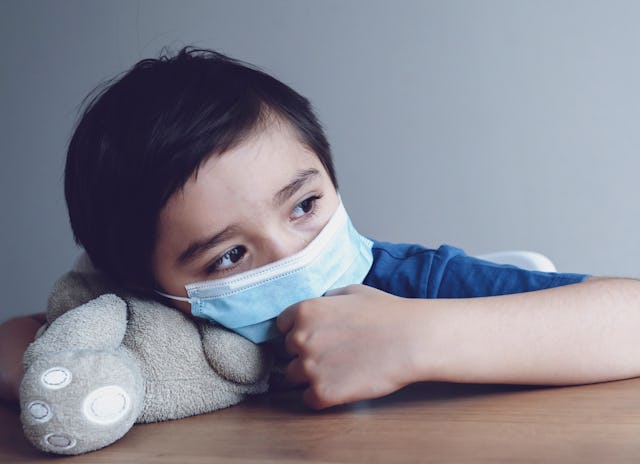Long COVID In Kids Is Real
Long COVID is not well understood yet, but it’s clear that some children are suffering long past initial infection.

One of the few reassurances that parents have had over the course of the pandemic is knowing that COVID infection in children is usually mild, and almost never fatal. Studies have shown that the rate of death from COVID for children is less than 0.03%, while rates of hospitalization are lower than 2% — and the actual rate of hospitalization might be even lower than that, as this data often includes children who test positive for COVID while they are in the hospital for another reason.
We also know that, two years into the pandemic, a lot of kids have had COVID. In February, after the omicron surge, the CDC released data showing that an estimated 3 in 4 children had been infected. While most recover without issue, often never even exhibiting symptoms, some children continue to experience at times debilitating symptoms weeks after infection. While only a small number of kids who get COVID will end up with long COVID, with so many kids infected overall, the number exhibiting long-term symptoms is becoming more significant.
There is no clear diagnostic criteria for long COVID, which has been associated with over 200 different symptoms. Many of these are subjective and hard-to-measure, such as fatigue, sleep disturbances, and concentration difficulties. A review of 14 different studies examining long COVID in children and adolescents published in The Pediatric Infectious Disease Journal found significant variations in the symptoms that children reported, as well as their duration. Six of the 14 studies showed that older (adolescent) patients were more likely to report symptoms of long COVID, and 3 of the studies showed that it was more prevalent among females.
Interestingly, of the 5 studies that included control groups (kids who hadn’t had COVID), 3 found persistent symptoms were more prevalent in kids who had been infected with COVID — meaning 2 studies found that kids who hadn’t had COVID were just as likely to be experiencing symptoms such as headache, fatigue, sleep disturbances, concentration difficulties, and abdominal pain. Researchers believe that the stress of the pandemic could be to blame for some of these symptoms, making it even more difficult to untangle which ones are attributable to long COVID.
Another study, analyzing data from 21 COVID studies across Europe, Asia, Australia, and South America found that 1 in 4 children who experienced symptomatic COVID develop long COVID.
In adults, it’s estimated that 30% of people who have COVID will continue to have long-term symptoms.
While the numbers for children may not be clear, kids and their parents know when something doesn’t feel right.
“I personally believe that this is a very much an undiagnosed issue,” Dr. Sara Kristen Sexson Tejtel, who works at a long Covid pediatric clinic at Texas Children's Hospital in Houston, told CNN.
Further complicating the matter diagnostically, children may develop long COVID symptoms weeks after an asymptomatic COVID infection. When they do come in for treatment, testing may all come back normal even though they are experiencing symptoms.
Sexon Tejtel told CNN she sees symptoms “to the point where the some kids aren’t able to go to school, grades are failing, those types of issues.” She explained that some kids have fatigue and cognitive symptoms, while others have palpitations and other cardiac symptoms. Still others suffer with gastrointestinal issues.
One of the most common symptoms kids experience is what’s called post-exertional malaise, meaning that one activity can leave them feeling wiped out for a while.
“It’s like they have one bucket of energy, and it has to be used carefully for school, for play, to watch TV. Every single thing they do takes energy, and once that bucket is empty, that’s it,” Dr. Amy Edwards, who runs a pediatric long COVID clinic at UH Rainbow Babies & Children’s Hospital in Cleveland explained to CNN.
Other issues confronting kids with long COVID include having their symptoms dismissed by some doctors, and not having access to specialty clinics that can offer them support.
“They’re told, ‘It’s all in your head. You’re just depressed,’ ” David Miller, a pediatric integrative medicine specialist, told Bloomberg. “But now we have so many of them. Not all the kids are trying to get out of school.”
While medical professionals are still trying to understand the extent of long COVID in children, and to figure out which treatments are most effective, there are a couple of things that parents can do. First, advocate for a child you think may be experiencing symptoms of long COVID and find a provider who takes your concerns seriously. Second, make sure your children are vaccinated. The vaccine is the best protection we have against the suffering that long COVID can cause.